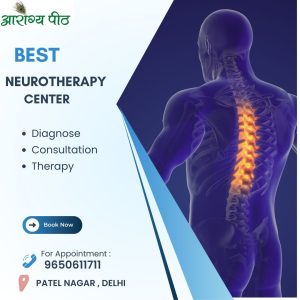Neurotherapy at Aarogyapeeth offers a holistic approach to healing by balancing the body’s neurological functions. Rooted in ancient principles and enhanced by modern scientific insights, Its focuses on diagnosing and treating disorders through natural methods. Aarogyapeeth, under the guidance of experts like Acharya Ramgopal Dixit Ji emphasizes non-invasive techniques to restore health and well-being. By addressing the underlying causes of diseases, its aims to bring long-term relief and overall health improvement to patients. Aarogyapeeth is dedicated to spreading this powerful healing method through its comprehensive training programs.
Understanding the Science Behind Neurotherapy
Neurotherapy is a natural healing method that focuses on correcting imbalances in the body’s neurological functions to promote overall well-being. It operates on the principle that the body’s organs are interconnected through neural pathways, and any disruption in these pathways can lead to various health issues. Neurotherapy involves non-invasive techniques that stimulate specific points on the body to restore proper nerve function, improving the body’s natural healing abilities. By addressing the root causes of ailments, neurotherapy offers a holistic approach to treating chronic conditions and promoting long-term health.At Aarogyapeeth, neurotherapy is applied through a series of carefully developed techniques designed to enhance neural communication, restore balance, and promote overall health. This holistic method is particularly beneficial for chronic conditions such as migraines, arthritis, and neurological disorders. The treatment is non-invasive, using natural methods to realign the body’s energies without the need for medications or surgeries.
Understanding the science behind neurotherapy is crucial for appreciating its benefits. It involves a deep comprehension of how the nervous system interacts with different parts of the body and how certain stimuli can correct imbalances. The success of neurotherapy lies in its ability to treat the root cause rather than just alleviating symptoms, offering long-term relief and improved quality of life.
How Neurotherapy Affects the Brain and Nervous System
Neurotherapy, or neurofeedback, is a form of brain training that uses real-time monitoring to help regulate brain activity. It affects the brain and nervous system by providing feedback to help individuals train their brains to function more efficiently. During sessions, sensors placed on the scalp measure brainwave patterns, which are then analyzed to identify areas of dysregulation. The therapy aims to normalize these patterns, enhancing cognitive functions and emotional stability.
By encouraging the brain to produce more balanced and optimal brainwave activity, it can improve focus, reduce anxiety, and enhance overall mental clarity. It also supports the nervous system by promoting better communication between neurons, which can alleviate symptoms of various neurological and psychological conditions. This non-invasive approach helps the brain retrain itself, leading to long-term improvements in mental health and cognitive performance.
Future Directions in Neurotherapy
Emerging Technologies and Techniques
Neurotherapy is rapidly evolving, with several emerging technologies promising to enhance its effectiveness. One notable advancement is the development of more sophisticated neurofeedback systems, which offer real-time brain activity monitoring and tailored interventions. Additionally, wearable neurotechnology devices are becoming more accessible, allowing for remote monitoring and treatment. Brain-computer interfaces (BCIs) are also on the rise, enabling direct communication between the brain and external devices, potentially revolutionizing the treatment of neurological and psychiatric conditions.
Ongoing Research and Innovations
Research in neurotherapy is increasingly focused on optimizing existing methods and exploring novel approaches. Studies are investigating the integration of neurotherapy with other modalities, such as pharmacological treatments, to enhance therapeutic outcomes. Advances in brain imaging techniques are providing deeper insights into how neurotherapy affects brain function, guiding more precise and individualized treatment protocols. Additionally, research into neuroplasticity is uncovering new ways to leverage the brain’s ability to reorganize itself, potentially leading to more effective interventions for conditions like depression, anxiety, and PTSD. As these innovations progress, they hold the promise of expanding the scope and impact of neurotherapy, making it a more versatile tool in mental health and cognitive enhancement.
Conclusion
At Aarogyapeeth, we are excited about the future of neurotherapy, driven by emerging technologies and ongoing research. The advancements in neurofeedback systems, wearable neurotechnology, and brain-computer interfaces are set to revolutionize how we approach treatment, making it more personalized and effective. Our commitment to staying at the forefront of these developments ensures that our patients benefit from the latest innovations and research insights. evolves, we are dedicated to integrating these advancements into our practices, enhancing our ability to provide cutting-edge care and improving outcomes for those we serve. The future of neurotherapy holds immense potential, and Aarogyapeeth is proud to be a part of this transformative journey in mental health and cognitive wellness.
Frequently Asked Questions
What is neurotherapy?
Neurotherapy, also known as neurofeedback, is a non-invasive treatment method that focuses on correcting imbalances in the brain’s electrical activity to promote overall well-being. It uses real-time monitoring and feedback to help individuals regulate brain function and improve mental health.
How does neurotherapy work?
Neurotherapy involves placing sensors on the scalp to measure brainwave patterns. These patterns are analyzed to identify areas of dysregulation. Feedback is then provided to help the brain train itself to produce more balanced brainwave activity, improving cognitive functions and emotional stability.
Is neurotherapy safe?
Yes, neurotherapy is a safe, non-invasive treatment method. It involves no medications or surgeries, making it a low-risk option for addressing various neurological and psychological conditions. Always ensure that you receive treatment from a qualified professional.
How long does a neurotherapy session last?
A typical neurotherapy session lasts between 30 to 60 minutes. The number of sessions required varies depending on the individual’s needs and the specific condition being treated.
How can I get started with neurotherapy at Aarogyapeeth?
To begin neurotherapy at Aarogyapeeth, you can contact our center for an initial consultation. Our experts will assess your condition and create a personalized treatment plan tailored to your needs.







